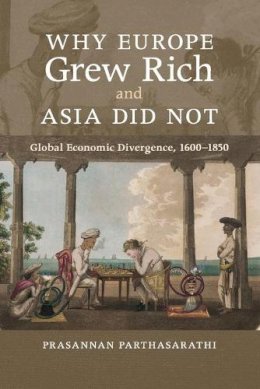
Stock image for illustration purposes only - book cover, edition or condition may vary.
Why Europe Grew Rich and Asia Did Not: Global Economic Divergence, 1600–1850
Prasannan Parthasarathi
€ 35.18
FREE Delivery in Ireland
Description for Why Europe Grew Rich and Asia Did Not: Global Economic Divergence, 1600–1850
Paperback. A striking new answer to the classic question of why Europe industrialised and Asia did not. Num Pages: 380 pages, 6 b/w illus. 4 maps 7 tables. BIC Classification: 1D; 1F; 3J; HBJD; HBJF; HBTK; KCZ. Category: (P) Professional & Vocational. Dimension: 227 x 154 x 17. Weight in Grams: 614. Global Economic Divergence, 1600-1850. 384 pages, 6 b/w illus. 4 maps 7 tables. A striking new answer to the classic question of why Europe industrialised and Asia did not. Cateogry: (P) Professional & Vocational. BIC Classification: 1D; 1F; 3J; HBJD; HBJF; HBTK; KCZ. Dimension: 227 x 154 x 17. Weight: 604.
Why Europe Grew Rich and Asia Did Not provides a striking new answer to the classic question of why Europe industrialised from the late eighteenth century and Asia did not. Drawing significantly from the case of India, Prasannan Parthasarathi shows that in the seventeenth and eighteenth centuries the advanced regions of Europe and Asia were more alike than different, both characterized by sophisticated and growing economies. Their subsequent divergence can be attributed to different competitive and ecological pressures that in turn produced varied state policies and economic outcomes. This account breaks with conventional views, which hold that divergence occurred because ... Read more
Why Europe Grew Rich and Asia Did Not provides a striking new answer to the classic question of why Europe industrialised from the late eighteenth century and Asia did not. Drawing significantly from the case of India, Prasannan Parthasarathi shows that in the seventeenth and eighteenth centuries the advanced regions of Europe and Asia were more alike than different, both characterized by sophisticated and growing economies. Their subsequent divergence can be attributed to different competitive and ecological pressures that in turn produced varied state policies and economic outcomes. This account breaks with conventional views, which hold that divergence occurred because ... Read more
Product Details
Publisher
Cambridge University Press
Number of pages
384
Format
Paperback
Publication date
2011
Condition
New
Weight
614g
Number of Pages
380
Place of Publication
Cambridge, United Kingdom
ISBN
9780521168243
SKU
V9780521168243
Shipping Time
Usually ships in 4 to 8 working days
Ref
99-1
About Prasannan Parthasarathi
Prasannan Parthasarathi is Associate Professor in the Department of History at Boston College. His previous publications include The Transition to a Colonial Economy: Weavers, Merchants and Kings in South India, 1720–1800 (Cambridge University Press, 2001) and The Spinning World: A Global History of Cotton Textiles, 1200–1850 (co-edited with Giorgio Riello, 2009).
Reviews for Why Europe Grew Rich and Asia Did Not: Global Economic Divergence, 1600–1850
'We have been waiting for more than ten years since Pomeranz opened the debate on the Great Divergence between China and the West for the book that brings India into the discourse. This magnum opus comes from a scholar with the credentials in economics, the erudition in history and the literary style required to occupy the intellectual high ground for ... Read more
